The nomenclature of Americana: an imprecise history
Will James’ comments on a previous blog suggested perhaps a little history might be in order. I shall try to be brief, will rely on no notes but my noggin, and invite correction.
In the beginning…I don’t remember what it all got called. There was a Cosmic Cowboy movement, and there was Cow Punk, and there was what Steve Earle refers to as the Great Credibility Scare.
In my beginning, Peter Blackstock and I sat down and talked about starting a magazine, building on the community which populated an AOL conversation group that had begun as an Uncle Tupelo fan board and morfed into something called “No Depression.” I can remember asking Peter if it was worth discussing other titles, and he made it abundantly clear that there was no point in having that discussion. Which was fine. I was at the end of a relationship, the title worked for me.
Let me amend here. In the typing of this, I forgot the second part because Peter and I both said it so often it seemed redundant to type it, except I am aware this little blog may end up being the artifact online which answers these questions. We chose the name No Depression not simply because of the Uncle Tupelo connection; we chose it because the song began with the Carter Family in 1936, resurfaced again with the New Lost City Ramblers in the folk scare of the late 1950s, and then again with Uncle Tupelo in 1989. Subsequently Rich Kienzle told me that Charlie Monroe (Bill’s older brother and one-time singing partner) had recorded it in the late 1940s, but that it hadn’t been released save for a Bear Family box I’ve not seen nor had money to buy. Though I’m still curious to hear it, and to hear Charlie’s collected works. Anyway. We liked that continuum of music, and the weird ways in which that song appeared and disappeared through popular culture. Now Sheryl Crow’s even recorded it, and I’m not sure what that means.
It was not our intent to spread our brand across a musical sound.
We sardonically called the magazine alt.country because, well, because Bev Chin had used those words to describe Tarnation, and I knew Bev as a retail marketer behind Soundgarden and Robyn Hitchcock and other fine acts A&M was in the business of making sure I knew about and liked. And Peter and I lived in Seattle, where the whole “alt” thing ran amok, so we though it was funny.
The joke stuck, though I’m not sure all that many people understood that it was a joke.
There were other terms of art vying to describe this music. Up in Chicago, the Bloodshot folks branded their music “insurgent country,” and down in Nashville the drummer and entrepreneur Billy Block styled it Western Beat, after Kevin Welch’s 1991 album.
Again, we didn’t really care. We were in the magazine business, and we had enough fun without carping about the names of things. Long as we spelled ’em right, which, mostly, eventually, we managed to do.
In the end, more or less, our magazine’s name came to tag a scene, even though we tried actively throughout our editorial not to be limited to anything which might be described as a scene. The operating hunch I shared with Peter at various times was that we covered artists who were too loud, too weird, or too old for country radio, but even that expanded. We covered the music we liked, plain as that.
Brands are for cattle.
There was and is another brand in the marketplace: Americana.
For a number of years Peter and I actively sought to distance ourselves from that word, simply because we thought what was played on the Americana chart was generally…too wimpy (my words, not Peter’s) for us.
And then Kyla and Brad (not Ron) Paul from Rounder Records and I don’t remember who all else set about forming what would become the Americana Music Association. Since I lived in Nashville, I ended up going to the meetings and serving on the board and all that. Kyla’s fault.
In the process of establishing the organization we hired a facilitator and brought 30 disparate players into a room adjacent to the Arista offices on Music Row. We spent two days together, and we on the planning committee had made clear to the facilitator that naming the thing would be the single most difficult challenge we faced. So we put it off to the end, when everything else had been agreed to.
Why?
Americana was a radio format. It was a chart in the Gavin radio trade journal. The term “Americana” in that usage, however, was trademarked by Jon Grimson, who was then a major promoter of Americana artists to Americana radio. (He has since, I believed, moved into video production.) Jon was a polarizing figure, in part I think because that unique relationship left other participants in our small world feeling he had taken unfair advantage. Or something. I don’t know. He was always a decent guy to me, but I wasn’t in his business.
Now, why was ND at such a meeting? Fair and troubling question. I’m an editor and a critic and an art director, and then by chance became a publisher. As co-publisher of ND I had a vested interest in the growth of the audience for our music, for only by growing the audience could we grow the magazine. So in that very specific role I became less uncomfortable participating in a trade organization. But it tripped a whole lot of my ethical wires, and I tried to be very careful how I participated. (And still they made me president of the AMA one year. I avoided re-election by becoming a parent.)
Anyway. The word “Americana” was clearly the term of art the industry used most of the time to describe the music we were forming a trade association to promote. But Jon Grimson owned the word, best I understood things.
So there we sat. And the question finally came up.
Jon stood up, looked around the room, and said, “If y’all are going to do what you say you’re going to do, you can have the trademark.”
And that was the end of that.
It was an enormously generous act, a selfless act. It was the right thing to do. I never got to know Jon well, and I never competed with him for clients. But I continue to have deep and abiding respect for that gesture, without which the Americana Music Association might not exist.
One more thing about names. We/they have to be careful marketing the awards show because Dick Clark owns the trademark to the American Music Awards. The lawyers worked it out so that our AMAs are called “The Americana Music Honors & Awards” or some such cumbersome rubric.
Fine. Whatever.
Now. People want to quibble about Americana as a term of art, or its boundaries, or what it means, or whatever? Good. Go to it. I’ll chime in, amend, do whatever, long as anybody’s interested. Or not.




